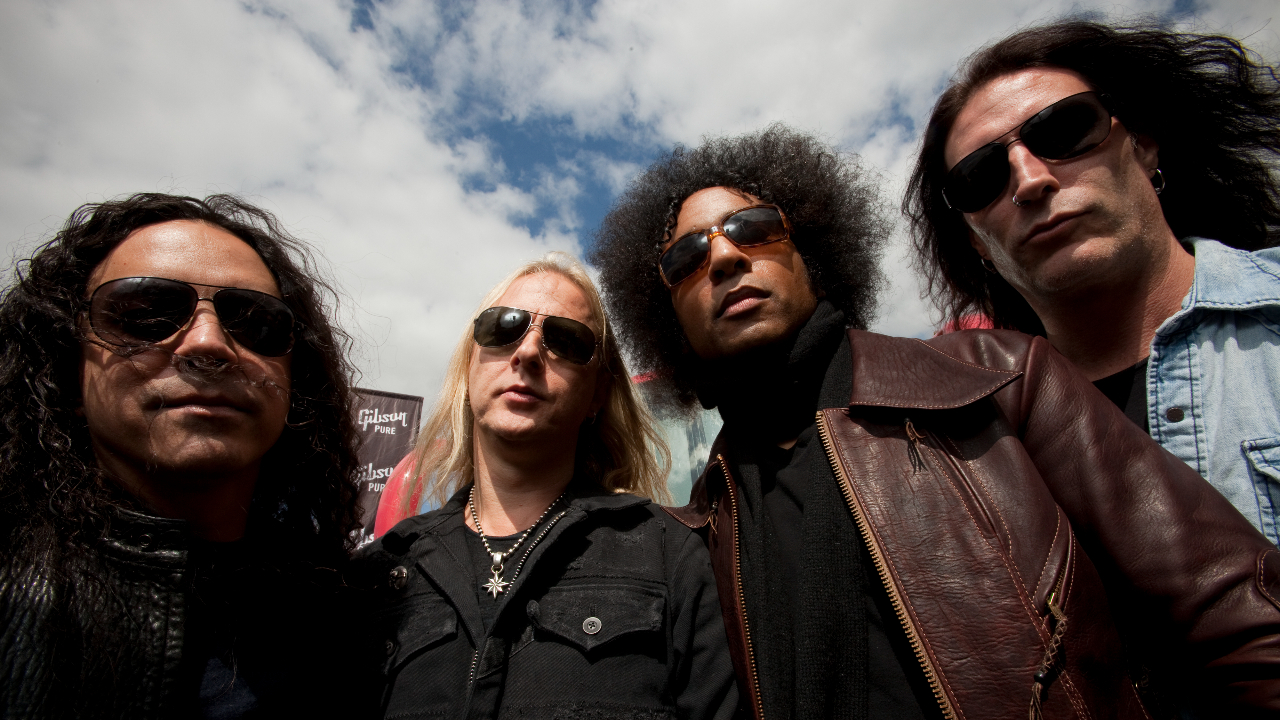Slash interview: rejoining Guns N’ Roses; Lemmy’s last days and the #MeToo minefield
Exclusive: Classic Rock talks to Slash about getting the band back together, getting older, and getting on with Axl
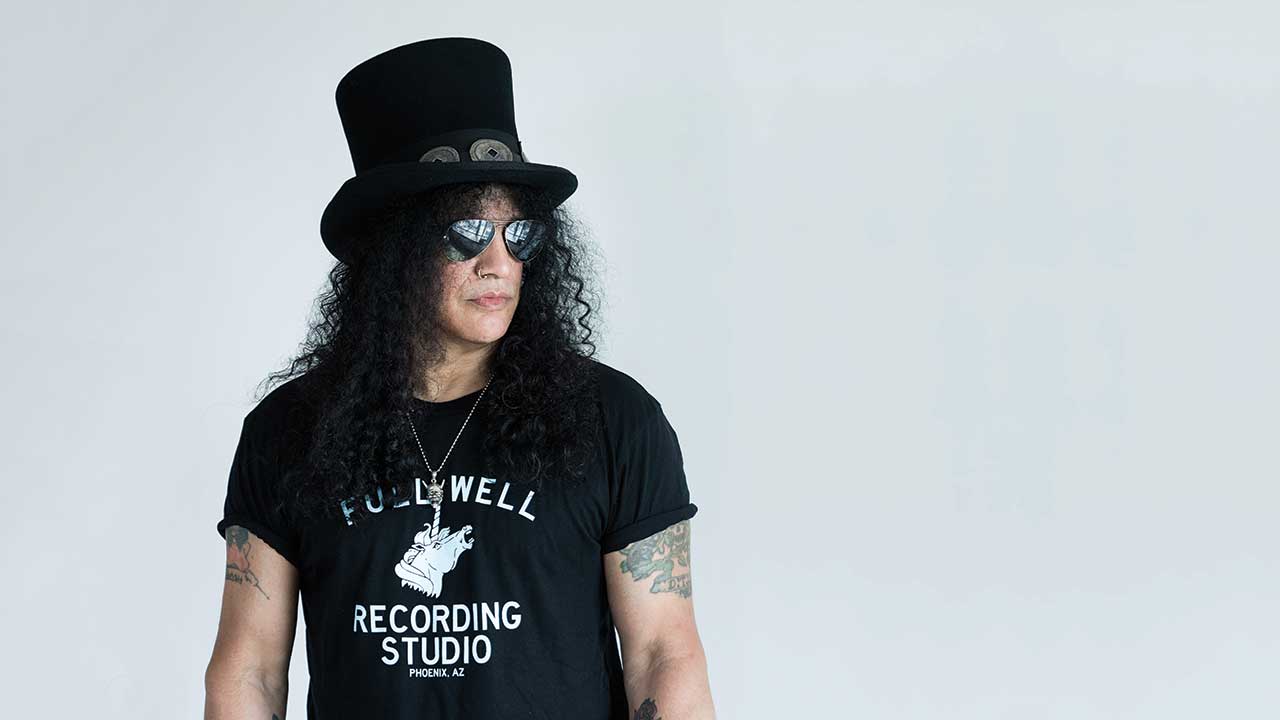
You know where you are? You’re in Bordeaux, baby – and it’s fuck-all like the jungle.
“These have got to be the happiest, most chilled-out French people I’ve ever met,” says Slash, looking out of the window of the hotel. “There were people out drinking in the streets until four in the morning. It’s like no one’s got work to go to.”
It’s midweek in the wine capital of the world, and in the bars of Bordeaux the French are cheering as Germany get knocked out of a World Cup that France will later win. This is the latest stop-over for what is literally the biggest show on earth: Guns N’ Roses’ Not In This Lifetime tour. Back in April, Billboard revealed that the band’s reunion tour was the fourth-biggest tour of all time – grossing $480 million so far. That was before they played 19 shows across Europe this summer.
It’s been a while since we caught up with him – four years, in fact – and we’re here to find out what’s going on in the world of Slash. Because so much has happened in the intervening years. In 18 months between 2014-16 he played more than 150 gigs all over the world. His former Velvet Revolver bandmate Scott Weiland died. Chris Cornell, who sang on Slash’s debut album, killed himself. David Bowie, who Slash first met aged eight, died. Lemmy, a long-time close friend, passed away after a long battle. In his personal life, Slash got divorced from his wife of 13 years, Perla, and rekindled a relationship with a woman he went out with when he was 25. Oh, and somewhere along the way Guns N’ fuckin Roses got back together. Slash, the master of understatement, Mr LaidBack himself shrugs. “I’ve been busy,” he says.

There are people who are worried about our conversation. Before I can speak to Slash I have to sign a contract that says that if anything goes wrong – if some kind of shit hits the fan because of what I write – and GN’R lose money, then Classic Rock carries the can. This is no small thing when you’re dealing with the fourth-biggest-earning tour of all time.
There is paranoia around. The Not In This Lifetime tour took a lifetime to put together, and no one wants to be the one to fuck it up. You might not have noticed, but Guns N’ Roses haven’t really talked to anyone since they re-formed. They haven’t done an interview.
Now Slash has a solo album coming, and so the burden has fallen to him. What will be said? What if I ask the tough questions? What if I make things awkward, open old GN’R wounds?
Sign up below to get the latest from Classic Rock, plus exclusive special offers, direct to your inbox!
And then there’s Slash. By his own admission, he’s not much of a talker.
“I’m definitely not any kind of orator,” he says. “I don’t, er, I don’t want to be somebody… I can’t. I’m just not a good speaker in general, as far as like being someone who has a lot to communicate verbally. It’s just not my thing.”
Does that frustrate him?
“I don’t know, maybe,” he says. Then, fuck it, he changes his mind: “No, I don’t give a shit.” Does he take that frustration and channel it into his guitar playing? “Yeah, I mean, guitar playing is that for me; it’s an extension of myself, it’s a way to express myself that I can’t do in any other sort of arena. The guitar is a release for me.
“I just love the fact that I can go and play every day. I do have frustrations in the fact that I cannot fucking put up a good fucking verbal argument with anybody for any length of time, but I just don’t have it in me,” he says, and his lips go into a sneer. “But I could knock you about with a guitar for a little bit.”
In conversation, Slash can seem cagey, maybe even distrustful – a guy who keeps his cards close to his chest. With his reckless years behind him – and his were far more reckless than most – you might even think that sober Slash is a bit of a control freak; a private guy who doesn’t give up much of himself.
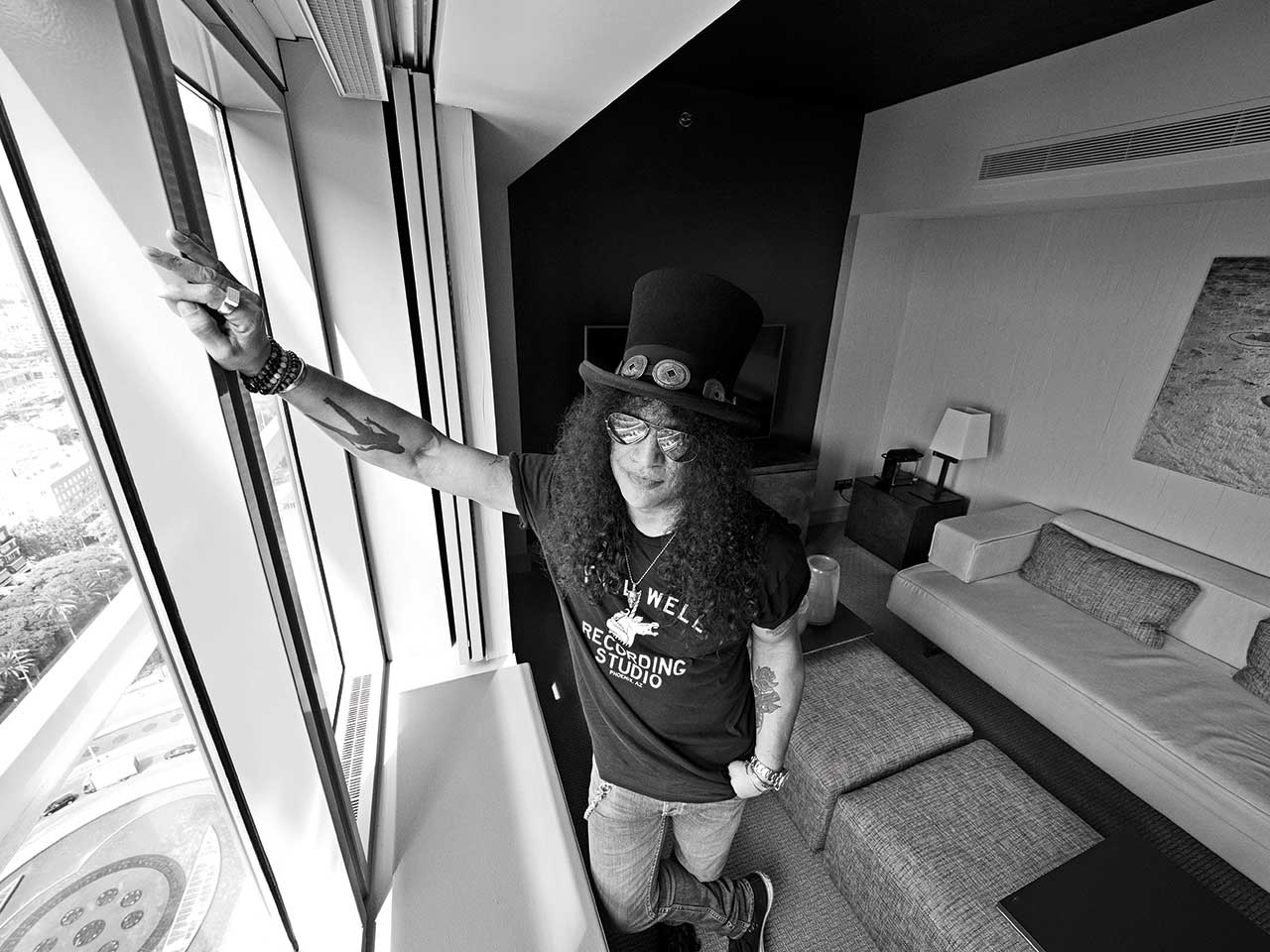
Having interviewed him a few times over the years, that’s definitely what I thought. And then something happened that made me think about Slash differently.
On December 19, 2016, the company that owned Classic Rock (and its sister magazines Metal Hammer and Prog) went bust. Staff at offices in Hamilton, Scotland, and London were called to a floor meeting and told to gather their stuff and leave, their services were no longer required. The company, TeamRock, had been liquidated and staff wouldn’t be paid for December. At the Hamilton office, the administrators were literally changing the locks on the doors as staff left.
Two days later, I was at home, shell-shocked. I’d worked at Classic Rock since 2004. I had no clue what to do next. Christmas decorations hang halfheartedly around the house and I’m cooking dinner for my kids when the phone rings – the home number; the only people who ring on that are our parents and cold callers. I pick up.
Hey, Scott?” says a soft American voice. “It’s Slash. What the fuck’s going on, man?”
And so, while I’m frying chicken for my kids, I tell Slash all about what happened, about the series of monumental management fuck-ups that led to TeamRock going bust.
There were many kind gestures in the following weeks, not least of which was the £80,000-plus raised by the public for the TeamRock staff. But Slash calling me at home – a small personal gesture, but one he didn’t have to do – was one of the standouts. He followed it up, too. A month or so later, with Classic Rock up and running again – bought by Future publishing, our previous home – he dropped me an email: “Hey,” he said, “just checking in. How’s everything working out?”
It might seem from the outside that we’re all friends with the rock stars we write about, but let me tell you that this does not happen.
“I was sort of devastated when I heard,” he says now. “It was like, fuck, there’s not really many magazines left and I had a relationship with you guys. It was really sad. So I was really happy that it turned around like it did…” Sure, I say, but you didn’t have to call…
He shrugs, like it’s nothing, like rock stars phone guys like me all the time. “We’ve known each other for a long time,” he says.
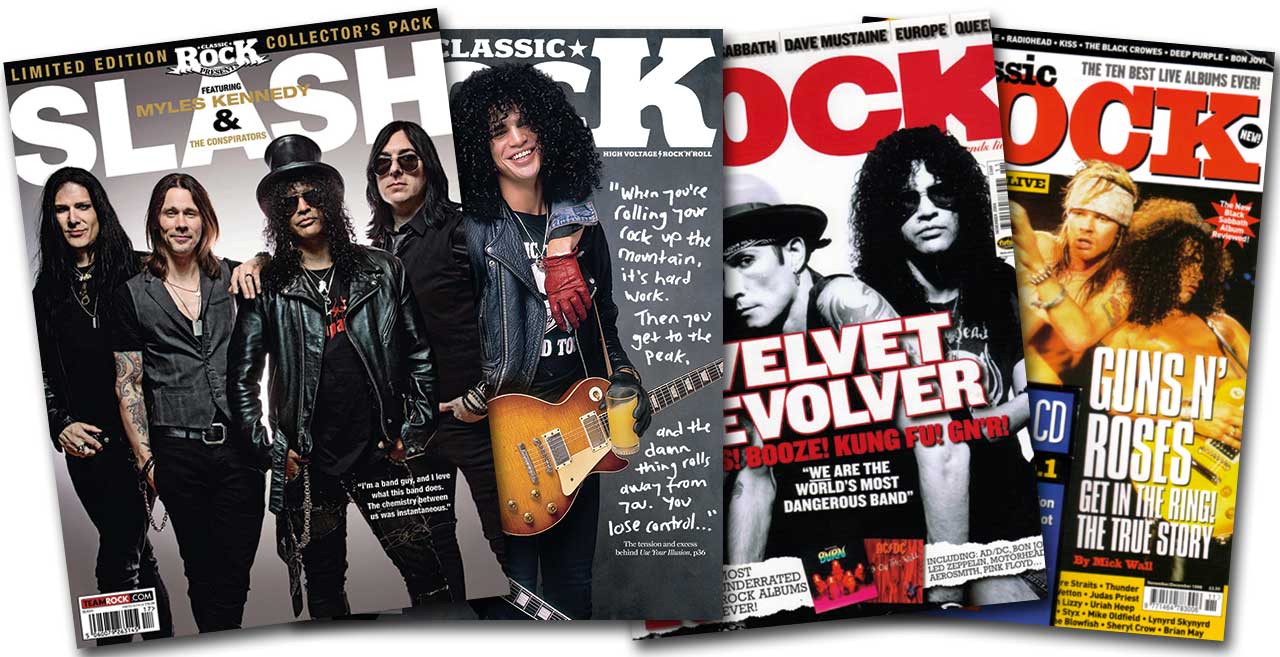
We have. Covering the past and continuing adventures of Guns N’ Roses has probably been the story of Classic Rock’s lifetime. The first issue of the mag was published more than a decade after the release of their debut album Appetite For Destruction, but that didn’t prevent the band being on the cover of that first issue and many (some would say too many) issues thereafter.
Classic Rock’s first permanent editor, Mick Wall, was one of the ‘punks in the press’ named in the Use Your Illusion track Get In The Ring, which brought him closer to the story than most. Our photographer Ross Halfin did the first ever magazine shoot of the band.
Then there was the aftermath: throughout the 90s and the 00s, Slash, Duff, Adler, Izzy, Axl, Sorum, Gilby et al were all working musicians – touring, releasing records, falling in and out of trouble and giving interviews all the while. Classic Rock was there when Velvet Revolver formed and when they split. We released all of Slash’s previous solo albums. We followed the story tenaciously, passionately. Sometimes, maybe we went too far. (So far, in fact, that I got letters from Axl’s lawyers on at least two occasions.) But that’s The GN’R Effect for you. They were the band that went too far – and it was infectious.

“I’ve been busy,” he says. Yeah, just a bit. From 2014 through most of 2016 Slash was on tour with The Conspirators, 150-plus dates, writing for the next record, working on “movie projects” and so on. And then…
“And then Axl and I talked,” he says, “and that was something that came totally out of the blue, totally unexpected. We talked and managed to alleviate some of this negativity that had been brewing.
“Not between us,” he stresses, “because we had never actually spoken. It was sort of perpetuated through the media and stuff, and it just became a running thing – the biggest rivalry or whatever. So it was really nice to talk.”
Axl and I talked... and that was something that came totally out of the blue, totally unexpected
Slash
The ice broken, after a few phone calls, Slash and Axl met in person. They’d been getting offers to re-form for the Coachella festival for ages, but had never even considered it. The Coachella Valley Music And Arts Festival, in Indio, California, had developed a reputation for putting on reunions: Jane’s Addiction reunited to play there in 2001, Siouxsie & The Banshees made a return in 2002, Iggy & The Stooges in 2003, the Pixies in 2004… you get the idea.
When the two of them met, Axl said: “You know, Coachella would be sort of fun, wouldn’t it?”
The plan was just to do two dates at Coachella and some warm-up gigs, but…
“We just had a fucking insane blast doing it,” says Slash, “that, you know, one thing led to another and the next thing you know we had booked a leg of a tour, and it just kept adding up and adding up.” And now that little get-together is the fourth biggest tour of all time.
“It’s been quite a fucking positive experience,” he nods.

Slash got his nickname from Seymour Cassel, a character actor famous for working with John Cassavetes and in later life for appearing in Wes Anderson movies such as Rushmore and The Royal Tenenbaums. As a kid in LA, Slash hung out with Cassel’s son Matt and, one day, Seymour just started calling the young Saul Hudson Slash. It stuck. No one knew what the fuck it meant but it sounded cool. Years later, on GN’R’s Use Your Illusion tour, Slash bumped into Seymour in Paris and asked him where he’d got the name from. Why ‘Slash’?
Cassel told him the name embodied what he saw as Slash’s “sense of hustle”. “His reason for calling me Slash,” the guitarist wrote in his autobiography, “was that I never stood still for more than five minutes. He was right. I’ve always been coming or going more than I’ve ever stayed still. I am perpetually in motion, often saying goodbye while saying hello, and Seymour summed that quality up in a word.”
He’s Slash in the sense of ‘and/or’ or ‘yes/no’ – not slash as in knife wound. He’s not a split, he’s a join, a conjunction. He’s not one thing, he’s both. A slash is used to link alternatives: black/white, English/ American. He’s a walking paradox, a duality. He’s a stereotype that defies categorisation. In maths the slash symbol is called a separatrix, the boundary separating two modes of behaviour. In the past he didn’t see boundaries.
The word ‘slash’ has its roots in the old French word ‘esclachier’, meaning ‘to break’. He’s been breaking things his whole life – records, rules, bones, hearts. But his appetite for destruction was matched only by his work ethic.
On the surface he’s chilled, laid back, so unassuming. But take a look at his work rate and it tells a different story: he never stops. Some rock stars, coming off what will surely be the highest-grossing tour in history, would probably, y’know, take a holiday. Instead, Slash has been prepping an album and can’t wait to get back into it. The fact that the album has been finished for months and it isn’t out yet has been driving Slash mad.
“I wonder how actors do it,” he says: “Finish a project and then you can’t release it for another four months or three months or whatever.” Writing for the new Slash Featuring Myles Kennedy & The Conspirators album began towards the end of the World On Fire tour – an 18-month schlep around the world – writing on the road, jamming at sound checks. And then Guns N’ Roses happened. Where other people would have given up on the solo career, as soon as Guns had a break – between January and June this year – Slash and his co-conspirators Myles, Todd Kerns, Brent Fitz and Frank Sidoris (in on the recording of an album for the first time) got back together and started revisiting those earlier ideas.

It’s rock and roll, it doesn’t take a hell of a lot of, like, board meetings and shit to get a song together
Slash
Slash bought a rehearsal room with a 16-track board a few miles from his house. When the band reconvened, on the very first session they wrote a brand-new song straight off the bat. “The first chords that we hit, after all that time, was something just to warm up,” says Slash, “and it became a whole new song, Mind Your Manners.” And then they went in the studio and knocked out an album. “Any kind of solo project that I do,” he says, “for me personally, is a quick, fucking hash it out and not too much thought involved, bam, done. It’s rock and roll, it doesn’t take a hell of a lot of, like, board meetings and shit to get a song together. It’s either good or it’s not, you know?”
The album, Living The Dream, is out now. Twelve songs with big choruses, crunching riffs and a whole load of guitar playing, it’s an album that sounds like it was made quickly – in a good way. No board meetings, no bullshit, just the kind of ballsy anthems that will keep arenas across the world bouncing for the next few months.
They threw it down quickly, Slash rejoined Guns for this 19-date European tour, “and then I’ll get home and then hook up with the guys and go out in September, release the record, then it’s Guns N’ Roses in Asia, and then come back and do Conspirators, and it’s going to be like that. That’s my life.”
You don’t have to work that hard, you know. Does anyone ever tell you that?
“I don’t mind working hard,” he says. “What’s exciting for me is to actually have something to do. It’s exciting to know that there’s something I’m doing tomorrow, as opposed to, like [twiddles thumbs], ‘Ah, hmm…’”
Because he’s Slash: one thing finishes/another begins.

The only time he can remember having nothing to do was in the period between Velvet Revolver and his first solo record (“the one with all the singers”).
“That period right there I was going, ‘Fuck. Now what am I going to do?’ Because, er, there was no chance Velvet was getting back together. I don’t know if you know this, but when Velvet Revolver first started I was knee-deep in doing a solo record. I was playing with Steve Gorman on drums. Actually that was where Fall To Pieces started…”
There’s an internet rumour that you were going to put together a band with Chris Cornell around then.
“I don’t know if that was ever a reality,” he says. “I didn’t even know that was a rumour. I did work with Chris on the solo record, but I never had any prospects of doing a band with him.
“Anyway, I was back to that solo stuff. Back in that place where I really didn’t know what I was going to be doing. So that’s when I embarked on the solo record, and then I met Myles, and Myles turned into a relationship that’s spanned eight years now.
“When we’re on the road, I write the entire time. That’s what I do in the dressing room or in my hotel rooms. I’ll play him something, or we’ll record it at sound check, and he keeps all that stuff and he works on it while we’re on the road or while he’s out with Alter Bridge or whatever he’s doing.”
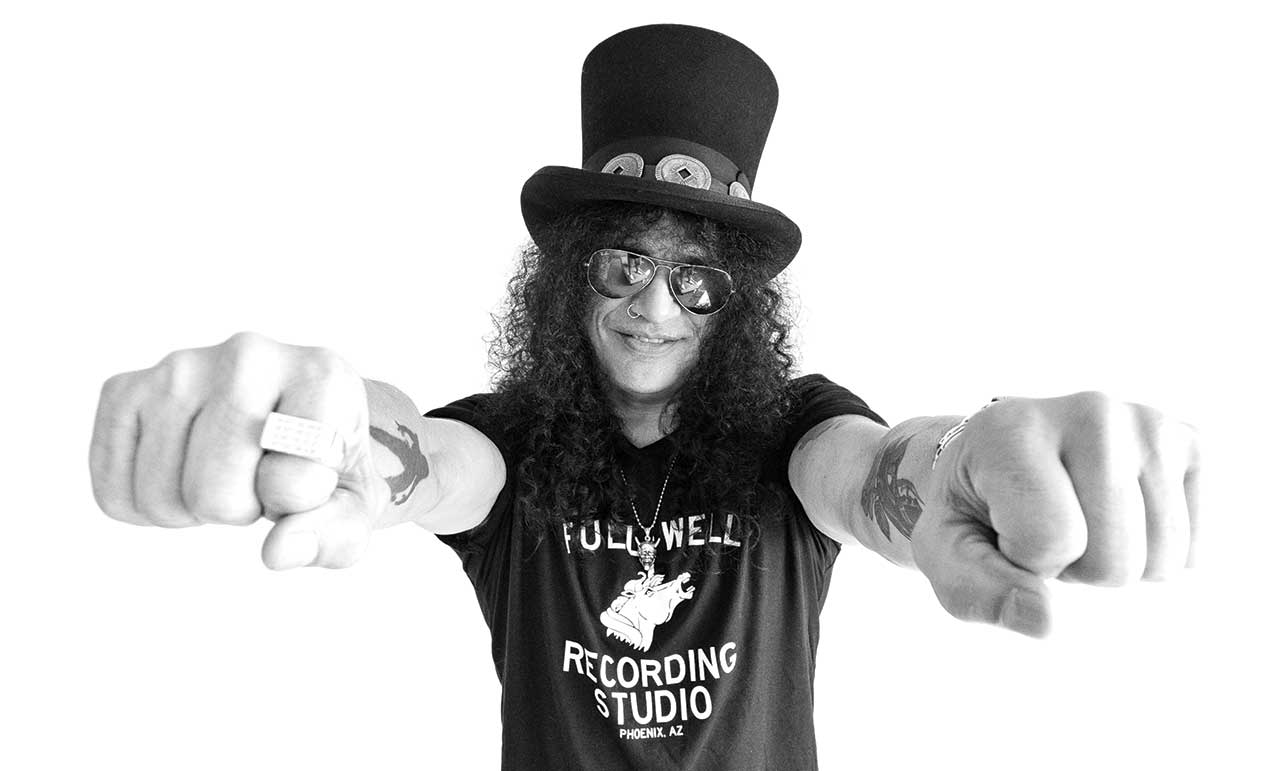
When Slash went out with Guns N’ Roses, he noticed that his writing began to change: “When Guns started doing its thing, then the kind of writing that I was doing was actually more tailored towards Guns, because that was the environment I was in. But then we took the break and I started thinking about doing the Conspirators record.
“When it comes down to it, a riff is a riff. It could work in either context. But with The Conspirators, anything I come up with, Myles will come up with something, and that’s why it’s such a diverse record.
“With Guns, you have no idea where that’s going to go either, so it’s really sort of hard to focus on one or the other. But I feel like while I’m out with Guns I’m thinking about Guns stuff. When I’m out with Conspirators I’m thinking of Conspirators. I’ve been doing The Conspirators for, like, eight years now. So there’s a certain kind of rhythm that I’ve gotten into with doing that. “With Guns, we haven’t sort of… we’ve just started to touch the surface of what that’s going to all be, so I haven’t really fallen into that groove yet. So right now there’s more of a question mark around that than with Conspirators.”
Wait: Have you announced this, that you’re writing for a Guns record?
“Well, it’s not been announced because there’s nothing official, so there’s nothing to talk about. I think everybody thinks it’s a good idea, and everybody would like to do it, and there’s no shortage of ideas, from everybody involved, but we’ve been so busy on the road there hasn’t really been time to go in and sit down and go: ‘Okay, we’re going to make a record.’”
A few weeks before Guns N’ Roses played Download, the Rolling Stones toured the UK. It made people ask the question: ‘When the Stones retire, who’s going to fill their shoes?’ Guns N’ Roses could easily do what the Stones are doing now: the big, world-conquering tour, an album every few years, room in the schedule for solo projects.
“Well, we’ll see what happens,” he says. “I mean, I have no prospects. Now that we’ve actually mended fences and gotten back together and done this, we’re going to keep it together. Because all the bullshit that we’d had that sort of caused all the shit back in the nineties, there was a lot of outside influence on that, and so now that that’s sort of eliminated we’re just left to our own devices. We get along fucking great.
“So I think we’re going to go well on into the future. I mean, Axl’s got a ton of shit that he recorded already, so we’re just going to get in there and just start getting into that thing, and then if we do a record and then do a tour, I could see that cycle going on endlessly.”
There’s a lot of conversation about kids not being into rock music these days. When you’re making a new album, do you feel under pressure to do something to grab kids’ attention?
“I don’t. I just can’t be bothered with trying to figure it all out, you know? I mean, somewhere in your mind you’re obviously conscious of the dynamics of what’s happening at the moment with music, and with the industry itself, and also with where rock’n’roll is at. But there’s not a hell of a lot you can do about it. Even if you were to set a goal, to go: ‘I’m going to change rock’, chances are you’re going to fail.
Now that we’ve actually mended fences and gotten back together and done this, we’re going to keep it together
Slash
“So you’ve just got to do what you do best, put your utmost integrity into it, make an effort and try and do it for yourself. That’s really where it comes down to: you’re doing all this for yourself, to satisfy some inner yearning to do something that you want to hear, or just to be whatever it is that you want to be, you know? But to think that you’re important enough to try and influence the entire industry is sort of a stretch.”
Some would say that Guns N’ Roses did it with Appetite For Destruction.
“Yeah,” he says, “but no one would fucking have expected that. I mean, granted, it’s a good record, and there’s a uniqueness to Axl’s whole delivery and the songs, but it’s got very unorthodox arrangements. Everything about that record is wrong for what was going on in music at the time. So I still can’t find the one thing that hit that nerve and created this longevity. You don’t bother trying to figure it out. Just be thankful that you were able to make a record that fucking reached that many people. Because it was such an honest record.”
Maybe that was what connected with people. “That could be it,” he says. “But sometimes I look out from the stage at that sea of people and wonder exactly how it’s transcended generations at this point, you know? It’s a trip.”

I put a call-out on Facebook and Instagram for people to share their experiences of meeting Slash, and got a load of stories from people amazed at his kindness and thoughtfulness.
Betty fell ill the week that she was supposed to go and see Slash in concert, meaning that she missed out on the gig and the meet-and-greet she’d paid for. Five years later, Slash heard about it and got her tickets and backstage passes so she could have their own personal meet-and-greet.
When Alissa was just starting out as a photographer, Slash spotted her in the photo pit with her “cheap crappy camera”. He took pity on her, and posed just for her for a minute or so, leaning into her lens, to help her get a shot.
Robert took his son, a big Slash fan, to see Velvet Revolver at Hammersmith. There was a reception afterwards, and when they got in they found Slash rowing with the organisers. Robert’s son wanted a photo of himself with Slash, so nervously Robert interrupted the argument to ask. “In the middle of the aggression,” Robert says, “he turned to us, smiled and said: ‘Yes, of course.’” He had a photo taken, chatted with the kid about guitars, and then went back to his argument.
“He reminds me of Lemmy,” says Gina Giambalvo-Glockler, the partner of Saxon drummer Nigel Glockler, who has a story of Slash taking time out at a festival to come and say hi to her daughter. “He’s a complete bad-ass yet always thoughtful. We need more people like this!”
“Lemmy was one of my all-time favourite fucking human beings,” says Slash, who spoke at Kilmister’s funeral. “We got to be friends back in 1987, when we first came over here, when Guns played those Marquee dates.”
Slash hung out during the sessions for Motörhead’s Rock’N’Roll album, drinking with Lemmy at London rock bars like the Intrepid Fox and the St Moritz. They became friends – “good drinking buddies and whatnot” – and Slash appeared on I Ain’t No Nice Guy and You Better Run on Motörhead’s March Or Die album in 1992. Much later, Lemmy appeared the track Doctor Alibi on Slash’s debut album, which featured a classic Lemmy response to the diagnosis of his failing health: ‘I went to see the doctor/ He said you’re pretty sick/ You got some real bad habits/You’d better stop right quick… Don’t you know that I feel alright/Doin’ what I do/I ain’t gonna toe the line/Not till I turn blue…’
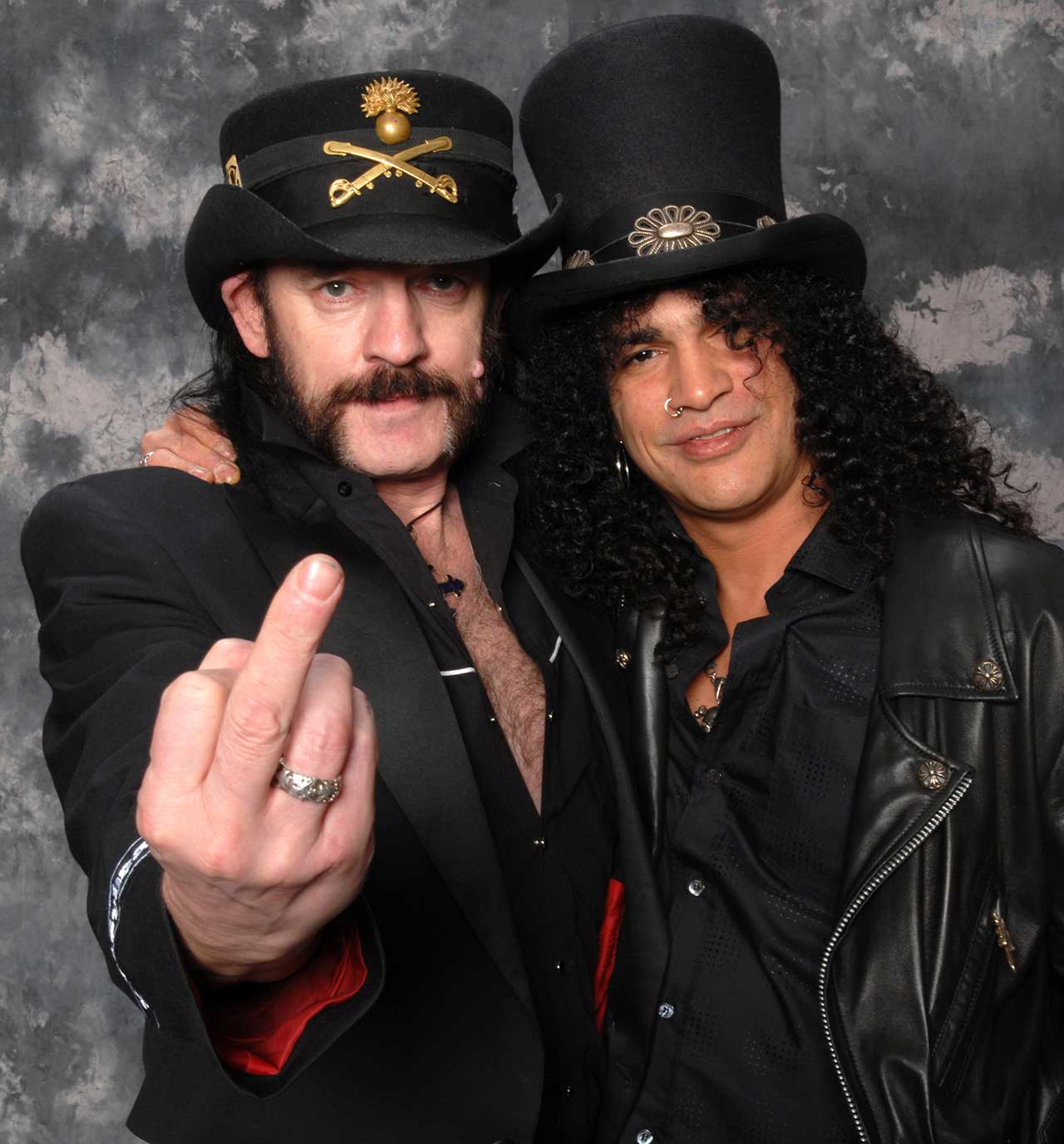
Lemmy was one of my all-time favourite fucking human beings
Slash
“When he got sick, it turned out that what he was suffering from initially was the same thing that I had been,” says Slash, “which was this cardiomyopathy thing.” (The British Heart Foundation describes cardiomyopathy as “a disease of the heart muscle which affects its size, shape and structure”.) “It’s where your heart enlarges to the point where it has nowhere to go,” Slash explains. “Which was just from excess. Mine was from alcohol, and his was probably from speed or whatever.
“So I told him that I had been through that and I told him what to do. So we sort of went through that together and he actually did pretty well. A dab of this, a dab of that, but he was… he really changed his whole thing. But unfortunately, because of his age, all the things that had been dormant – with the amount of chemicals he was taking that shut all that shit from happening – all of a sudden surfaced. So he had a lot of kidney problems, and this problem and that problem. But he was a tough motherfucker. He kept working through it.”
And while Lemmy was having all these tests, says Slash, they never discovered that he had cancer. “Suddenly they go: you’ve got stage-four fucking cancer. And that late in the game it was really not even possible that he was going to survive it. It was really, really sad. To me, it was really losing somebody that was one of the greatest friends to have, and one of the greatest mentors, one of the greatest pillars of what rock’n’roll is to me. Just one really sweet motherfucker.
“There’s so many guys out there that think you have to, you know, wear your leather jacket and be the tough guy, be rude and a fucking slob and break shit, to be rock’n’roll. And Lemmy dispelled all that because he was a perfect fucking gentleman. Very considerate and polite to everybody around him, and yet he was as hard-core a fucking rock’n’roller as you’re ever going to find.”
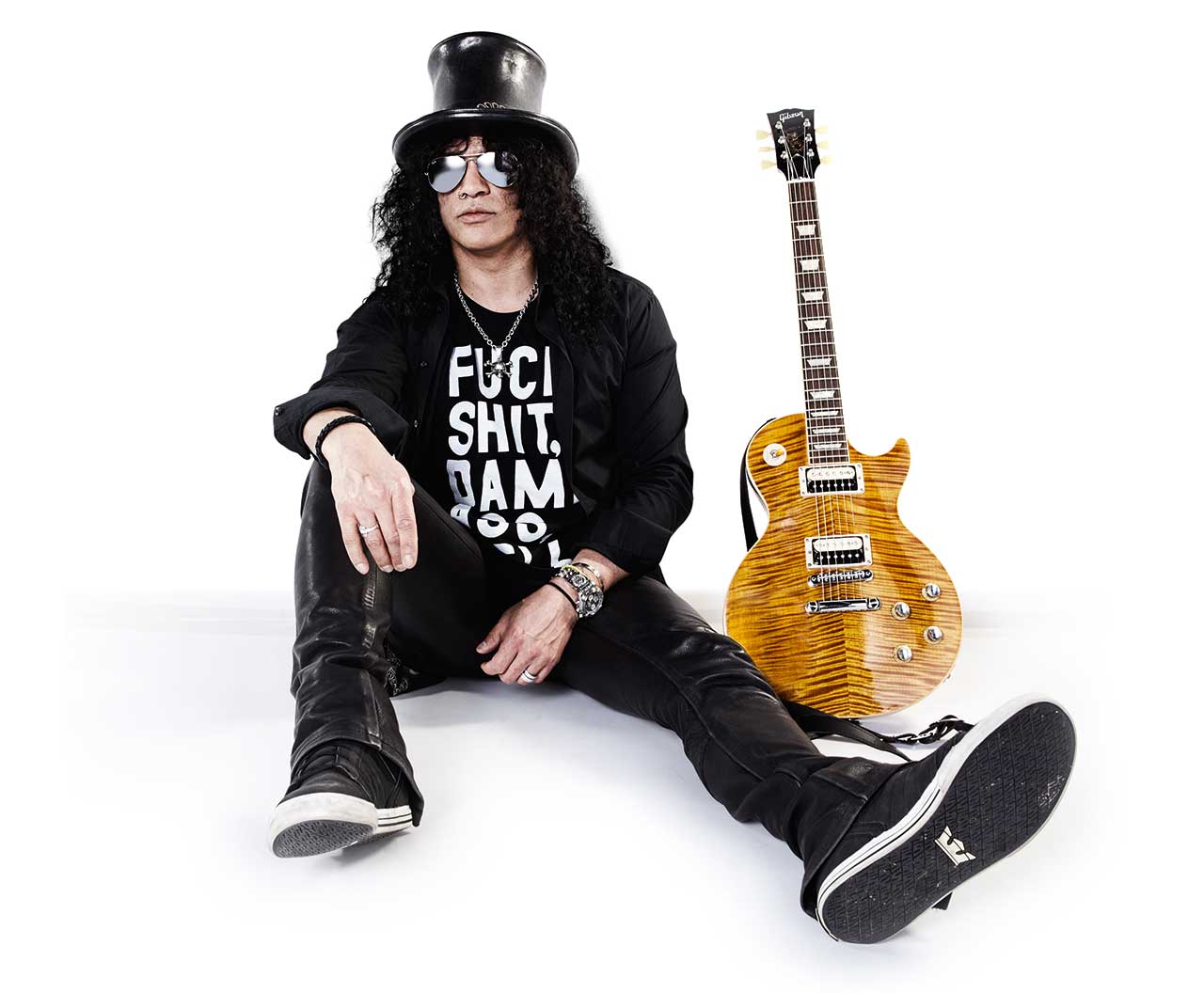
The GN’R live set includes a few tributes to fallen friends. Witchita Lineman was a tip of the cap to Glen Campbell, while Soundgarden’s Black Hole Sun was added as a tribute to Chris Cornell. “It just became something that we don’t feel comfortable taking out of the set now,” Slash says. Their epic versions of Layla and Wish You Were Here, meanwhile, are in there just there because they like playing them. “There’s no message there,” he says. “It would be brilliant if I had a real reason, but there isn’t.”
People are always looking for meaning in what Guns N’ Roses do. One difference between GN’R of the 80s and 90s and today’s incarnation is the rise of social media. There were always rumours and scandal surrounding Guns N’ Roses, but now blog sites, social media and web forums have taken it to a new level.
“I’m on social media for marketing,” he says. “I mean, to promote gigs or to promote a record. You can talk to fans in a direct way that you couldn’t before.” On Instagram, Slash’s feed is a continuously entertaining stream of garish smut and comical horror gifs. “My Instagram is just me jerking off.” (Is it actually him who posts? “Oh yeah,” he says with a grin. “Who else is going to do that shit?”) But he’s careful not to get sucked in; he doesn’t read any of the comments. “It’s too much,” he says. “I don’t want to be in that world where you’re just glued to what everybody else thinks and everybody else has to say about stuff."
A photo posted by @slash on Sep 15, 2018 at 1:45am PDT
“It’s hard, but myself and Duff, and a lot of guys I work with, none of us go down that path, and everybody else we know does. That’s where I get all my information from.
“The depths to which people go in social media… This is a phenomenon that has changed society completely. It’s deep, man. It’s a huge outlet for cowards, a fucking horrible way for people to distance themselves and to get further away from being able to communicate directly.
“It’s craziness, you know? Especially around a band like Guns. People tell me about [what people are saying] all the time, and I don’t even want to know about it, because it’s just too much. It’s overwhelming to me.”
Almost to illustrate the point, I mention the rumour that Slash’s new partner, Meegan Hodges, and her friend (and Axl’s ex-) Erin Everly, somehow helped get Guns N’ Roses back together.
“Oh God, no,” he says. “See, this is what we don’t want to get into. Because there’s so much bullshit talk out there. Erin had nothing to do with anything. Are you saying that Meegan and Erin got Guns N’ Roses back together?”
The rumour came from Mick Wall’s Guns N’ Roses book The Last Of The Giants. Mick wrote that Meegan somehow started the conversation. “I haven’t to spoken to Mick in ages so he doesn’t know shit about anything,” he says. “I’m sorry, Mick, but… Because no one [in Guns] is doing any press, no one wants to talk about anything personal. I’ve spent the last… since two thousand and fucking eight or whatever, avoiding Guns N’ Roses questions, and my life has been a lot better because of it. So I am not about to get into that now, you know. But no, there’s no truth to that.”
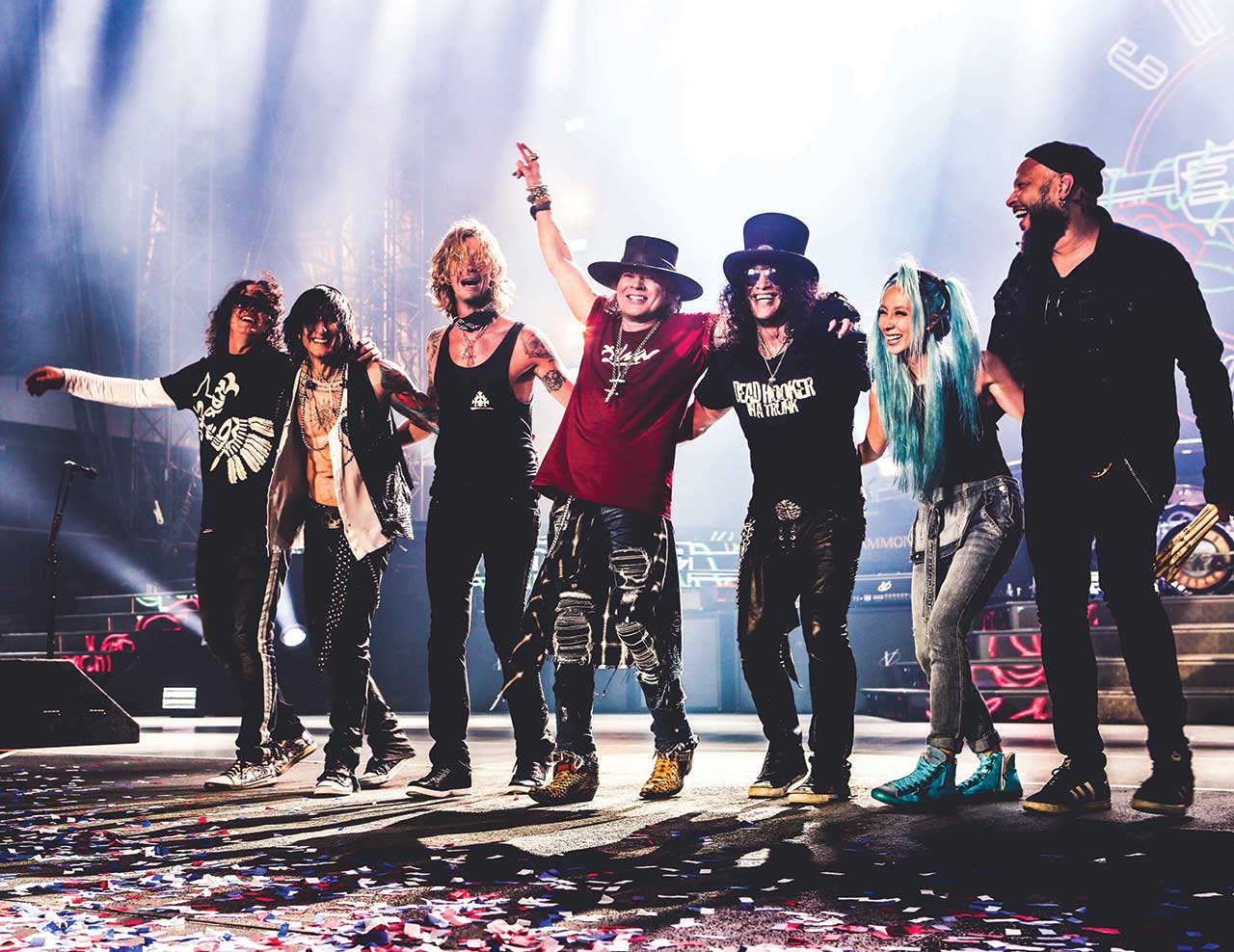
Well, let’s settle something else while we’re here. For years, Guns N’ Roses have been famous for appearing on stage late. Since you’ve rejoined, that problem seems to have been cured. What’s the difference? How is this Guns N’ Roses getting on stage on time?
“I don’t know, man,” he says. “Axl’s been fucking amazing. He’s been so professional that it blows my mind. I mean, he’s always been professional, but obviously we had some issues with a lot of different things back in the day, but there was a lot of reasons that I wasn’t really aware of… You know, there was such a divide-and-conquer thing going on around us by somebody who will remain mentionless, that we never could get to the core of that problem.
“When we went to do those Coachella gigs, in the back of my mind I was wondering how this was all going to go. But Axl’s been fucking unreal. We’ve been playing for the last almost two years without a fucking hitch. No matter what’s been thrown at him.
“But it’s not because of anything that was said. I think there’s a rumour going around that said that I would quit [if the band were late to the stage], or that there was some contract. None of that. There was nothing even mentioned about it.”

The day before our interview, Tool frontman Maynard James Keenan’s reputation was on trial on Twitter: a woman had anonymously claimed that the singer had raped her when she was seventeen. Has the #MeToo movement affected the music business?
I think the Me Too Movement is definitely justified – it’s actually way overdue
Slash
“It’s a good question,” he says. “I think the Me Too Movement is definitely justified – it’s actually way overdue.” But obviously, he says, it’s complicated “in the context of being in a fucking rock and roll band. Fortunately, I’m taken, so I’m not dealing with all that, but I have to admit there were times I looked into my past and [as if he’s talking to himself]: ‘Well, that was consensual.’
“I never had a working relationship with anybody that I was, you know, trying to pressure into having sex or anything.
“The problem is that you could be falsely accused of something, but it almost doesn’t matter – it’s out there. Even if you were to get your name cleared, the damage is already done. And that’s pretty sad.
“Hopefully the plus side of it is that women will be treated more respectfully, especially in positions where they’re working under people who are tremendously powerful. Because I know how that one used to work: rich guys with a lot of money and a lot of power felt completely enabled to get whatever they wanted, you know? So hopefully this first wave will sort of even out and people will just start to treat each other a little bit more respectfully.”
And he says he’s not a good talker.
What’s the worst thing about getting old?
“I don’t have an issue with it," he says. "I hate people who bitch about their age all the time, because it just makes them old, you know. It does."
Slash’s eldest son is 15 and in a band – he’s already going out gigging, and the band have recorded a three-song demo – and sometimes that makes him feel old.
“The teenage generation does not understand or relate – or want to be too close to – the older generation,” he says. “There’s a definite separation where it’s them against us. It doesn’t matter how cool you are, it doesn’t matter what you’ve accomplished, it doesn’t matter what wisdom you have to share, it doesn’t matter where you’ve been, who you’ve met, you’re still an old fucker and you don’t understand.”
He remembers his mum’s boyfriend getting into the likes of Elvis Costello and Devo and saying that Led Zeppelin were dinosaurs and the new wave was the future. “He was twenty-three, and I thought: ‘You’re fucking old!’” he says, laughing. “I’ll never forget that moment.”
Years later Slash was the other end of it. He was hanging out with Ronnie Wood, staying at his house for a while, and Ronnie’s daughter Leah was dating this kid who was into the Gorillaz. “And he was disgusted at the Rolling Stones and Guns N’ Roses and all those old bands. He wouldn’t look us in the eye. It was just a really uncomfortable scene at the house because of this kid. He had this genuine distaste, the way punk rockers did for ELO or Emerson, Lake And Palmer back in the day. So it is just what it is.”
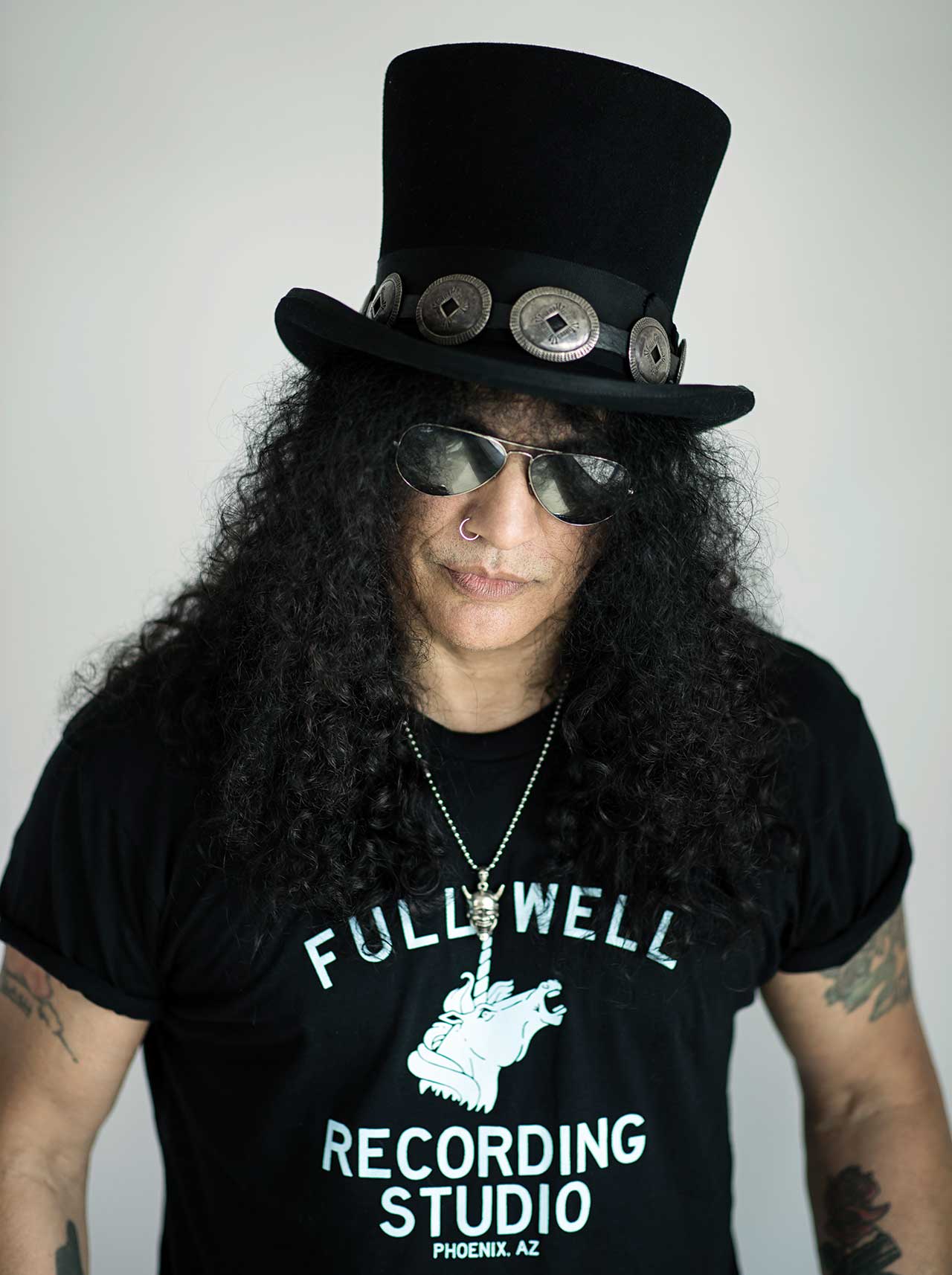
And what about when it comes to talking to his kids about drugs? How does he deal with that minefield?
He groans. “Well, I wrote that stupid book,” he says (referring to Slash - The Autobiography). “When I was doing book tours for the book, I was asked more than a dozen times: ‘What about when your kids read it?’ I said: ‘My kids are never going to read it. They’re never gonna be interested to see what dad had to say about anything.’ “
But my eldest turned around one day and decided to read that fucking book. So now, any time I have anything to say to him about school or work, or whatever it is that he doesn’t necessarily want to hear, he can fucking fire back at me: ‘Well, in your book you said…’
“But the drugs thing is a real issue. I had a lot of freedom growing up. My parents didn’t know what I was up to for the most part, and they were so liberal; in the sixties and seventies, that whole mind-set was so different. But with kids now you really are way more aware of their surroundings and where they are and where they’ve been. You really keep a watchful eye over them, compared to when I was a kid.
“The drugs thing is what it is. You’ve just got to sort of steer them in the right direction, but you can’t be the fucking gestapo about it because you have to always remember back to when you were a kid and people were telling you ‘no’, you went in the opposite direction. The other thing is that most of the drugs nowadays don’t actually come from God’s earth. How good a chemist do you think Brian the fucking drug dealer is? The guy didn’t even graduate from junior high.”

So there he is. Thirteen years clean and sober, back in his old band, touring the world on one of the biggest-selling tours of all time. He’s in a new relationship, with four kids between them, and he’s got the freedom to do his movie projects and make solo albums. It’s worked out alright, hasn’t it? Like his new album’s title, he really is living the dream.
“Just to get one thing straight,” he says, “the title, Living The Dream, has nothing to do with that. It was totally about this current state of global unrest. It was a tongue-in-cheek sort of joke. I’m not one to advocate politics, but I have to take little stabs at it where I can, as innocuously as possible.
“I mean, if you were to sit there and put any news channel on right now and spend a good two hours watching it, that’s when the sarcastic ‘living the dream’ statement comes to mind. World On Fire was similar.
“But at the same time, for me personally, you know, in essence that’s true. I know it sounds corny, or gratuitous, but I mean, yeah, I get that. There is some truth to that…”
Once when he was still at school, Slash fell asleep in class during a discussion about stereotypes. The teacher woke him, this scruffy kid in jeans and leather jacket, and started quizzing him in front of the whole class. Was he a musician? What instrument did he play? What kind of music? Slash/Saul told him. “Notice, class,” the teacher said gleefully. “This young man is the perfect example of a stereotype.” Slash got up, flipped the teacher’s desk over and left the school forever.
Don’t judge him too quickly.
Living The Dream is out now via Snakepit/Roadrunner Records.
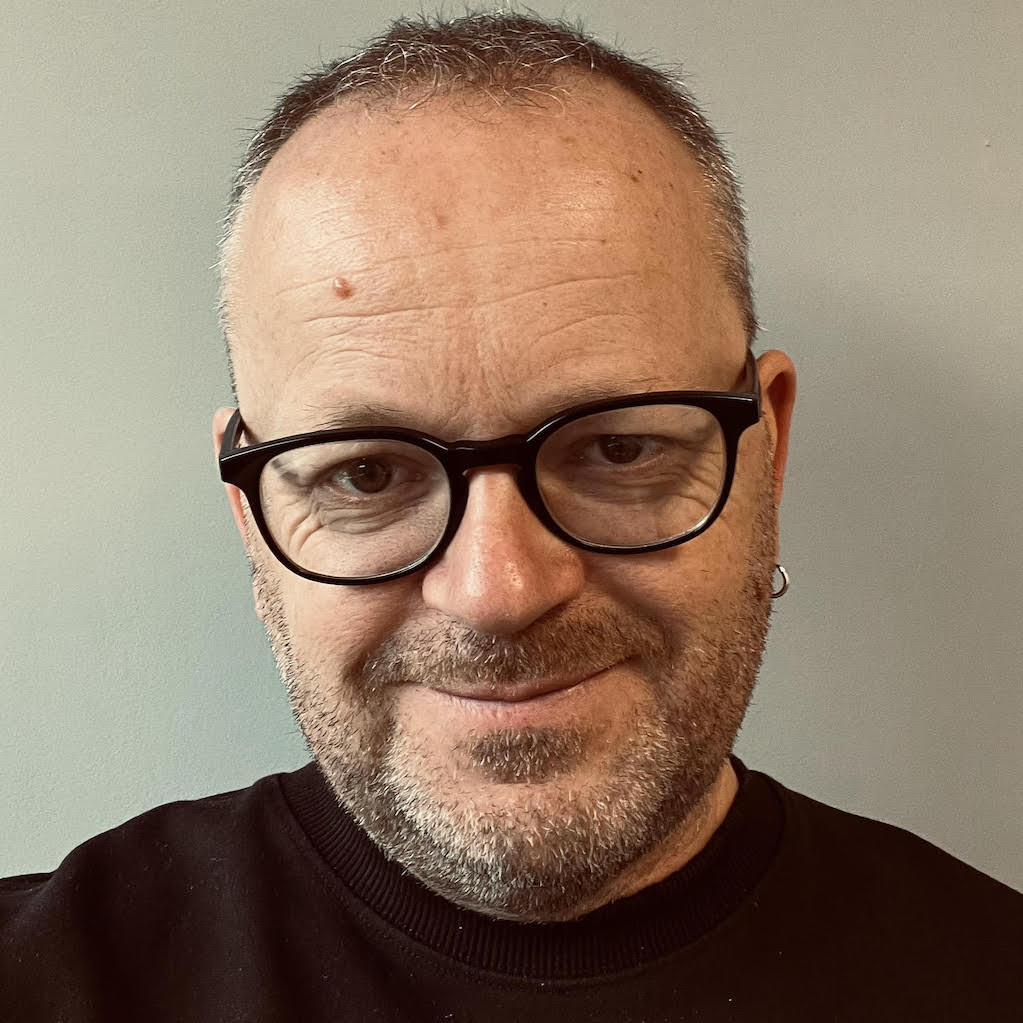
Scott is the Content Director of Music at Future plc, responsible for the editorial strategy of online and print brands like Louder, Classic Rock, Metal Hammer, Prog, Guitarist, Guitar World, Guitar Player, Total Guitar etc. He was Editor in Chief of Classic Rock magazine for 10 years and Editor of Total Guitar for 4 years and has contributed to The Big Issue, Esquire and more. Scott wrote chapters for two of legendary sleeve designer Storm Thorgerson's books (For The Love Of Vinyl, 2009, and Gathering Storm, 2015). He regularly appears on Classic Rock’s podcast, The 20 Million Club, and was the writer/researcher on 2017’s Mick Ronson documentary Beside Bowie.
